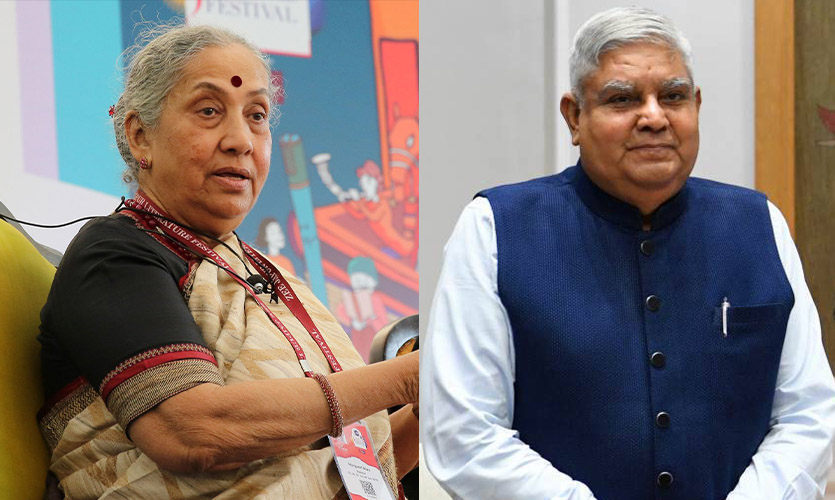A Jat leader who has had several run-ins with Mamata Banerjee’s government in West Bengal during the last few months, Jagdeep Dhankhar was named as the National Democratic Alliance’s (NDA’s) candidate by the Bharatiya Janata Party (BJP), for the August 6 vice presidential election. BJP president JP Nadda made the announcement following a meeting of the party’s highest decision-making body, the parliamentary board, chaired by Prime Minister Narendra Modi. Nominations for the election must be filed by July 19. “He is known as the people’s governor… the NDA decided that the ‘Kisan-Putra (son of a farmer) who is fully equipped in administrative capacity will be our nominee,” said Nadda.
It is almost certain that Dhankhar will be elected vice president since the BJP has the majority of Lok Sabha and Rajya Sabha members in the electoral college. There are 780 MPs in the Parliament, and the BJP alone has 394 members, more than the 390 required to have a majority.
After deliberating on several names, the BJP selected 71-year-old Dhankhar as the NDA’s candidate. “Jagdeep Dhankhar Ji has excellent knowledge of our Constitution. He is also well-versed with legislative affairs. I am sure that he will be an outstanding Chair in the Rajya Sabha and guide the proceedings of the House with the aim of furthering national progress,” tweeted PM Modi on July 16, following Nadda’s briefing.
A first-generation professional and lawyer from Rajasthan’s Jhunjhunu, Dhankhar began practising before the Supreme Court in the 1970s. He served as a senior advocate in both the Supreme Court and the Rajasthan High Court. As a central minister, Dhankar held the Parliamentary Affairs portfolio. A member of the Rajasthan assembly since 1993, he represented the Kishanganj constituency. Dhankhar joined the BJP in 2003.
He was a representative of the Janata Dal in the Lok Sabha from 1989 to 1991, and had a contentious working relationship with West Bengal CM Mamata Banerjee. Since his appointment as West Bengal’s governor on July 30, 2019, he has made it clear that when he raised issues with the Banerjee government and the state assembly, he did so in accordance with the law and the Constitution.
Jagdeep Dhankhar’s political and legal background may aid the BJP in enacting legislation in the Upper House, and forging agreements to govern the House where Opposition leaders are more engaged, once he assumes the office of Rajya Sabha Chairman. However, his present task is to boost Rajya Sabha output and obtain agreement on unfinished business. The Upper House currently has 26 bills pending.
Political observers say that with Dhankhar’s nomination, the BJP seeks to appease two crucial constituencies: the agricultural community in the country’s north which was at odds with the government over the now-repealed farm rules; and the Jat group, which has political clout in Rajasthan, Haryana, and parts of Uttar Pradesh. Although the Jat community is not uniform, they are classed as OBCs in Rajasthan, and are asking for reservations in western Uttar Pradesh and Haryana. Since 2014, they have primarily backed the BJP.
On the other hand, Margaret Alva, a senior member of the Congress, will run as the opposition’s nominee in the vice presidential election. On July 17, a gathering of 17 opposition parties in New Delhi resolved to back her as their candidate.
In her extensive political career, Alva has held a variety of positions, including that of a cabinet minister, governor, and a MP. Nationalist Congress Party chief Sharad Pawar made the announcement during a gathering of opposition parties at his home.
The opposition leaders’ meeting began at 3 pm and ended at 4:30 pm, according to the Indian Express. It was attended by Rajya Sabha’s Leader of Opposition Mallikarjun Kharge, DMK’s TR Baalu, Shiv Sena MP Sanjay Raut, CPI leaders D Raja and Binoy Viswam, Marumalarchi Dravida Munnetra Kazhagam (MDMK) leader Vaiko, TRS member Keshav Rao. Samajwadi Party leader Ram Gopal Yadav, CPI(M) leader Sitaram Yechury, IUML member ET Mohammed Basheer, and RJD’s Amarendra Dhari Singh. Alva has also received support from the Aam Aadmi Party, which was not present at the meeting. Moreover, the Trinamool Congress, and the Left parties will also support the senior Congress leader.
Elections for the office of the Vice President of India are scheduled for August 6, with counting taking place the same day. July 19 is the deadline for filing nominations. Vice President M Venkaiah Naidu’s term will end on August 10. In this election, the country will elect its 14th Vice President. Under Article 66 of the Constitution, the Vice President is elected by the Lok Sabha and Rajya Sabha (both elected and nominated members).
Yashwant Sinha had been announced by the opposition parties as their candidate for the presidential elections on July 18, while Droupadi Murmu is the NDA nominated candidate.
Read more: Who Are The Candidates In The Race To Become The President Of India?










